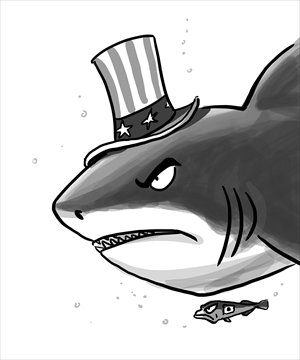Japan nervous about future of Asia-Pacific

Among those keeping an eye on the latest China-US presidential meeting, Japan is definitely the most anxious.
On one side of the Pacific Ocean, the meeting has just concluded, while on the other side, Japanese Prime Minister Shinzo Abe stressed that Japan and the US are close allies. "I can't see the US moving the base for the Seventh Fleet from Japan to Shanghai."
No politician will underestimate US-Japan relations just because of one China-US presidential meeting. The anxiety of Abe is Japan's habitual reaction toward a closer Sino-US relationship, and it also shows his little confidence in the prospects of US-Japan relations.
Japan's influence has grown amid the US-led postwar system. Japan is most concerned that the system would turn to one led by both the US and China.
Therefore, Beijing's statement that "the vast Pacific Ocean has ample space for China and the US" will soon be misinterpreted by Japanese media as "China will stick to an assertive attitude in its maritime strategies."
The postwar security system in the Asia-Pacific region was built up and dominated by the US. The arrangement by the US constrained the revival of Japanese militarism to some extent and prompted political and social reforms in Japan.
But Washington's arrangement was done out of its own interests during the Cold War era which has left many repercussions, for instance, the cleanup of war criminals and the territorial dispute over the Diaoyu Islands. These problems have created trouble for current Sino-Japanese relations.
As China's strength increases, and China and the US are starting to build a new type of great power relations, Japan's anxiety is intensifying. Closer ties between China and the US may mean a more balanced geometry in this region.
Japan can be convinced of the US leadership, but it will never be willing to follow or adapt to the fact that China is participating in and leading Asia-Pacific affairs.
The closer relationship between China and the US will make Japan strive to participate in Asia-Pacific affairs in a more independent manner.
Currently, the Abe administration has shown an aggressive stance in its political, economic and diplomatic affairs.
Domestically, it is promoting the amendment of the Peace Constitution and the development of military strength. Abroad, it is trying to expand its influence, especially to consolidate its position in Southeast Asia by shifting its industries.
In regions where ethnic and religious conflicts occur occasionally such as Myanmar and the Philippines, Japan has joined their peace-construction process through investment and assistance. Japan's influence in the Asia-Pacific region is on the rise.
The Japan factor has become an important variable in the transformation of future security system in the Asia-Pacific region. This factor has become increasingly prominent in Sino-US relations.
Some issues which seem to only concern Sino-US relations will become more complicated when Japan is indirectly involved.
China, when dealing with its relations with the US, has to take Japan and Sino-Japanese relations into consideration. So does the US, especially when the US is trying to share with China the dominance of Asia-Pacific affairs.
There is no final conclusion yet as what role China will play and what position it takes in the reconstruction of the political and security pattern in the Asia-Pacific region in the future.
But judging from the basic path of China's diplomatic strategy, China still hopes to construct a multilateral system. The joint management by both China and the US is not China's strategic option.
In future Sino-US relations and the positioning of each other's roles, the question that how Japan is perceived by China and the US in the future pattern is inevitable. How the three sides will interact also catches the attention of all countries in the Asia-Pacific region.
This is not simply a question of whether we should take a tough stance toward Japan over territorial issues. Well handling relations with Japan is important for both China and the US sharing rights, and especially vital for China's future position in the Asia-Pacific region.
The author is a senior editor with People's Daily. dinggang@globaltimes.com.cn